By Elizabeth Brownlee
Figuring out what you want to do with your life is difficult for a 30-year-old adult, so you can imagine teenagers have a tough time with it.
House Bill 5, passed in 2013, increased the pressure for our students to plan for their future careers at an earlier age. All ninth graders are now required to select one of the following endorsements:
- Arts and Humanities Endorsement
- Business and Industry Endorsement
- Multidisciplinary Endorsement
- Public Service Endorsement
- STEM Endorsement
An “endorsement” is a series of courses that are grouped together to support a particular career path. To implement this requirement successfully, schools have had to expand career exploration opportunities for students, and also start the career exploration process sooner.
At Connally ISD, one of the major ways we help our students find their future career path is through the Connally Career Tech Early College High School. Our campus is completely focused on students working towards their chosen future careers. We help them get started on their career path and get experience in their chosen fields before they graduate. As the counselor of Connally Career Tech I spend a lot of time with students trying to help them create plans not only for high school, but for their futures once they graduate. It may seem unrealistic to ask a fifteen-year-olds to plan out their future career paths and expect them to stick to it, and maybe it is, but getting them to start thinking and talking about a path is important.
For me helping a student choose a career path is all about building a relationship. I know in education we constantly talk about test scores and grades, but when it comes to being a counselor, you have to build relationships with your students. Getting to know my students and their interests helps me guide them along their career exploration path. I am constantly trying to get to know my students. I try to see them in their element, whether it’s while they’re in study hall, in the classroom, or just talking to their friends. I talk to parents about their student’s interests. Parents have insights into their student’s likes and dislikes that I may not see.
My relationship with a student is my most important tool for helping them. I need to know what’s important to them. Without the relationship, I wouldn’t be able to have those important, hard, honest conversations when their goals and their interests don’t seem to match.
Sometimes a student will want to study for a particular career path because an older sibling really likes it, when in reality he/she has no interest in that career. He/she is just unsure of what to do in the future. I never try to force a student in a certain direction. I give them an idea and tools to help them research it to see if it’s something they are truly interested in pursuing. If possible, I have them speak with someone in the field or someone teaching in that field.
I find a lot of students want to go into a career field because that’s all they’ve been exposed to growing up. We’ve all heard of doctors, lawyers, police officers, teachers, and similar careers. We see them all the time and they are all great career choices, but they don’t fit all students.
Each year when we have our College and Career Fair or our Recruitment Night for Connally Career Tech, I bring my students to speak to specific tables or programs that I know fit with what they want to do in the future. By encouraging a student talk to someone from a field they don’t automatically think about, I help them get exposure to new choices. While I want them to go and talk to every program or table that interests them, I want to make sure I help them see what they wouldn’t normally choose.
We also try to take our students on field trips that cover multiple career fields. This helps expose our students to different careers they may not think of right away. It is my goal to help my students find out about the lesser known, sometimes behind the scenes careers they don’t always know about. Many times I get to go with them and observe their reactions. This helps me guide them in their career choices. Students will come back from a field trip and begin to have conversations about what they saw, what they liked or didn’t like. Then we start moving forward with career planning based on what they tell me.
My students and I spend a lot of time talking about their career goals for the future and how their high school choices are helping them get to that career. Sometimes a student settles on a career choice, but then they get to experience a little bit of it. They may come and tell me that it’s not what they thought, or they didn’t realize everything that went into that career and they want to change. That is probably one of the best parts of our program. Students get to experience at least a little of what a particular career is like before they graduate from high school. They don’t have to wait until after high school and waste money and time working towards a career that they end up not enjoying. I want them to be able to make well informed decisions about their future career. For many students, the experiences we provide help them do that. I’ve seen too many students graduate from high school unsure of their future. I make it one of my goals to help my students have a plan or a vision for their career path before they graduate.

Elizabeth Brownlee is in her 4th year as the Connally Career Tech Early College High School Counselor and her 10th year in education. She has been married for just under a year. She and her husband have two pit bulls and chihuahua. In her free time, she enjoys crafting, running, and anything outdoors.
The Act Locally Waco blog publishes posts with a connection to these aspirations for Waco. If you are interested in writing for the Act Locally Waco Blog, please email [email protected] for more information.
By Hermann Pereira
Being an educator is one of the most rewarding and difficult careers around. We constantly invest our time and effort into the next generation and the school year feels like a marathon. So by the time the summer hits we just want to prop our feet up. But educators are some of the most dedicated professionals around so we spend our summers attending professional development sessions in order to improve at our craft.
This past summer teachers at Connally ISD had the unique opportunity to participate in a teacher externship program through a grant that we were awarded through the University of Texas STEM Center. The goal of the externship was to interact directly with science, technology, engineering, and mathematics (STEM) industry leaders and learn about industry trends, needs, and opportunities that they can bring back to the classroom to enhance instruction and ultimately, student learning and achievement. We had 19 teachers from a variety of teaching fields who engaged with industry partners here in Waco. In this blog we will highlight 3 of our teachers and what their takeaways were from the program:
Liesel Wilson – Spanish/AVID
 The recent Tex2 summer externship that I was a part of was truly an eye-opening experience! As a classroom teacher for 25 years, I have plenty of educational experience, but not a lot of encounters with the business world. This opportunity to spend time with various local businesses and learn first-hand how teachers could better prepare future candidates for the job world was an invaluable lesson.
The recent Tex2 summer externship that I was a part of was truly an eye-opening experience! As a classroom teacher for 25 years, I have plenty of educational experience, but not a lot of encounters with the business world. This opportunity to spend time with various local businesses and learn first-hand how teachers could better prepare future candidates for the job world was an invaluable lesson.
I was able to visit HOLT CAT Machines and Engines, KWTX TV, Central Texas Iron Works, Vossloh, the Lacy Lakeview Police Department, and a robotics class at TSTC. At each location, the overwhelming response to what our students were lacking was the basic knowledge of soft skills. Applicants need to be aware of proper interview dress, use of cell phones (or lack thereof), the importance of eye contact, and a firm handshake. This take away was something that I was easily able to implement daily both inside and outside the classroom. Upon entering, all students must shake my hand and look me in the eye while saying “Good morning”, or “Nice to see you”. It was important for me to first teach my classes HOW to shake hands and the implicit value of body language and eye contact. After MUCH practice, this has become second nature to my students. I use myself as an example of the NO cell phone policy that many workplaces enforce. Students are not permitted to text during class time, so I also follow this rule. Leading by example shows students that I value the rules and understand why they are in place.
All in all, the externship was a tremendous experience. I am happy to say that the takeaways were relevant and definitely worth spending time on to ensure that students will be ready to face the world of work after graduation!
Liesel Wilson has been in education for twenty-four years. She currently teaches Spanish 2 and is one of the AVID elective teachers at Connally High School. In her free time, she loves to read, trail run, and have amazing travel experiences with her children Joslyn and Savanna.
Julia Jirovsky – Debate Coach
 As a communication teacher, the opportunity to speak with employers around Waco in the TEX2 externship was tremendously valuable. Speaking with Express Employment Solutions highlighted a need for students to leave high school with an understanding of professional documents such as résumés and cover letters. Specifically, students can give themselves an edge in the job market by submitting résumés that are not adapted from popular web templates. In addition, touring manufacturing operations such as Englander dZignPak and Vossloh taught me that many of the most successful employees, regardless of education level, are ones that show up on time, ask questions, and take initiative in the workplace. It was validating to learn that the skills Waco’s job market craves are ones that we teachers can reinforce every day in every content area. We can hold our students to high standards, require attendance and timeliness, knowing that these soft skills will propel our students to success after graduation.
As a communication teacher, the opportunity to speak with employers around Waco in the TEX2 externship was tremendously valuable. Speaking with Express Employment Solutions highlighted a need for students to leave high school with an understanding of professional documents such as résumés and cover letters. Specifically, students can give themselves an edge in the job market by submitting résumés that are not adapted from popular web templates. In addition, touring manufacturing operations such as Englander dZignPak and Vossloh taught me that many of the most successful employees, regardless of education level, are ones that show up on time, ask questions, and take initiative in the workplace. It was validating to learn that the skills Waco’s job market craves are ones that we teachers can reinforce every day in every content area. We can hold our students to high standards, require attendance and timeliness, knowing that these soft skills will propel our students to success after graduation.
Julia Jirovsky is a second year teacher and debate coach. She is a graduate of the University of Texas at Austin and currently teaches Debate, Professional Communication, and Principles of Education and Training. In her free time, Julia enjoys judging debate, crafting, and going to metal concerts.
Miranda Flanary – Business
 As a business education teacher with prior work experience, it is important to take advantage of ways to refresh and renew my knowledge what is happening in today’s workplaces. The externship offered this invaluable opportunity as I was able to gain insight at a variety of local employers, including KWTX Channel 10, DeuxSouth Creative, Caterpillar, Sherwin Williams, and the City of Waco. These businesses each demand very different levels of education and work experience amongst their employees. However, there was a consistent message when it came to transferable skills: these are the foundation on which any successful employee is built. Dependability, reliability, willingness to learn, and communication skills are essential, regardless of the hard or technical skills needed for a job. This information allows me to reference real-world expectations at real-world employers, beyond my own work experience, to drive home how students need to be prepared for the next stages in life.
As a business education teacher with prior work experience, it is important to take advantage of ways to refresh and renew my knowledge what is happening in today’s workplaces. The externship offered this invaluable opportunity as I was able to gain insight at a variety of local employers, including KWTX Channel 10, DeuxSouth Creative, Caterpillar, Sherwin Williams, and the City of Waco. These businesses each demand very different levels of education and work experience amongst their employees. However, there was a consistent message when it came to transferable skills: these are the foundation on which any successful employee is built. Dependability, reliability, willingness to learn, and communication skills are essential, regardless of the hard or technical skills needed for a job. This information allows me to reference real-world expectations at real-world employers, beyond my own work experience, to drive home how students need to be prepared for the next stages in life.
Miranda Flanary is a native Wacoan and has been in education for five years, following careers in financial services and human resources. She currently teaches Principles of Business, Marketing, and Finance; Entrepreneurship; and General Employability Skills and is the CTE department head. In her free time, Miranda enjoys live music, traveling, trivia, and spending time reading and drawing with her 8 year old son Regan.
Opportunities like this need to continue because the beneficiaries of these programs are the students of our community. When public educators, the business community, and higher education entities come together the possibilities are endless.
Connally would like to thank all of our partners that made this experience so meaningful. We look forward to connecting with them and others this next summer:

 Hermann Pereira is the Principal of Connally Career Tech Early College High School and AVID Coordinator and has been in education for 12 years. He is a Houstonian who roots for all Houston sports teams, but has called Waco home for the past decade. He has been married to his wife Kristi for 14 and a half years and has two children, Hudson who is 10 years old and Ruby who is 7 years old.
Hermann Pereira is the Principal of Connally Career Tech Early College High School and AVID Coordinator and has been in education for 12 years. He is a Houstonian who roots for all Houston sports teams, but has called Waco home for the past decade. He has been married to his wife Kristi for 14 and a half years and has two children, Hudson who is 10 years old and Ruby who is 7 years old.
According to the Prosper Waco website, one of our goals in the community of Waco is to “Increase youth employment.” In my job as Workforce Coordinator at Communities In Schools (CIS) that goal is in the front of my mind every day. When asked about writing a success story about our Workforce program, it was hard for me to pick! There are countless successful youth that I could highlight in an article. I could point to many of our clients who have challenged themselves to overcome their barriers and have worked tirelessly to be victorious in education and employment. For example, the young person I will profile in this post balanced a multitude of responsibilities and has been extremely successful in her educational and employment journey.
 Selena Hernandez originally started in the Communities in Schools program at La Vega High School. After high school graduation, she was referred to the Workforce Development (WIOA) program as she had a strong interest in obtaining her nursing degree. After attending MCC for her prerequisite courses and meeting the rigorous nursing school requirements, she was accepted into the Registered Nursing Program at MCC. Selena was able to maintain her responsibilities as a mother, keep up her grades and work overnights at Providence Hospital Emergency Room in Patient Registration. While on her journey to become a nurse, Ms. Hernandez ran into some educational challenges but with the help of Communities in Schools and her own self-determination she was able to push through.
Selena Hernandez originally started in the Communities in Schools program at La Vega High School. After high school graduation, she was referred to the Workforce Development (WIOA) program as she had a strong interest in obtaining her nursing degree. After attending MCC for her prerequisite courses and meeting the rigorous nursing school requirements, she was accepted into the Registered Nursing Program at MCC. Selena was able to maintain her responsibilities as a mother, keep up her grades and work overnights at Providence Hospital Emergency Room in Patient Registration. While on her journey to become a nurse, Ms. Hernandez ran into some educational challenges but with the help of Communities in Schools and her own self-determination she was able to push through.
There were many times she would visit the office and have her children with her. They would play and we would work on job readiness activities and talk about her aspirations and struggles. She is the definition of a multi-tasker! Ms. Hernandez received her Licensed Vocational Nurse (LVN) credentials in Summer 2017 and completed the RN Program in December 2017. She dedicated her time to her family and her studies and became a licensed RN in 2018.
Selena is now employed at Quality Care Nursing Facility as a Nurse Supervisor and works PRN (as needed) at the Atrium Nursing Facility as a Registered Nurse.
She was able to attend her classes and clinicals, meanwhile balancing employment and her responsibilities as a wife, mother, and daughter! She is a true rock star. To know Selena is to know an outgoing and compassionate heart. She shows such amazing compassion for her family, patients, and those around her. She has a positive outlook on life and she is certain to make you laugh with her humorous personality. When you look at Selena’s journey you will find that the path to success is paved with dedication, time, and finding a way to move past setbacks. She has taught us that if you have a passion, you should follow it with every twist and turn!
The Workforce Development Program at Communities In Schools provides career coaching to youth ages 16-24, both in and out of school, to assist them in educational attainment and reaching their post-secondary goals. The Workforce Development program provides academic assistance, GED preparation, career exploration, assistance with entry into post-secondary education, and job placement opportunities. For more information, please visit www.cishot.org or email [email protected] today!
The Act Locally Waco blog publishes posts with a connection to these aspirations for Waco. If you are interested in writing for the Act Locally Waco Blog, please email [email protected] for more information.
By Jaja Chen
I often hear individuals make comments about teachers that make it seem as if they have it “well off” because of having summer vacations. While having summer off is a crucial part of teachers’ self-care and work-life balance, we often do not sit and consider the amount of energy, finances, or even time that teachers dedicate throughout the school year – year after year – to managing their classrooms and educating our children daily.
Oftentimes, teachers’ own self-care goes by the wayside because of the immense amount of needs they must tend to in their classrooms, amongst students, and to meet all the tasks and demands they face as a teacher – even outside of the classroom. This can lead to summer being used to “catch up” on sleep, health, and self-care.
While summer can be a huge part of teacher self-care, my hope is that summer is not the ONLY time when teachers are able to take care of themselves.
Here are three ways we as a community can seek to support our teachers in self-care as they return to the new school year:
1.) Honor and encourage our teachers – Coming from a Taiwanese background, educators are highly honored, valued, and esteemed. The culture of honor that East Asian cultures place on teachers is something we can learn from. How can we honor and encourage our teachers throughout the school year? Rather than making comments about how good they have it or how they shouldn’t complain about difficulties on the job due to having summer off, how can we seek to listen to and support our teachers as they deal with ongoing work-life stress?
2.) Support healing from secondary trauma & burnout – Compassion fatigue is a common experience amongst helping professionals and is a combination of secondary trauma and burnout. Secondary trauma occurs when we continually hear about or witness, directly or indirectly, traumatic events that occur to others. Working with students and families daily exposes teachers to traumatic events and can lead to secondary trauma. Burnout, on the other hand, is feelings of ongoing exhaustion and helplessness due to inefficiencies experienced in our jobs. When our teachers experience compassion fatigue, do we judge them or do we seek to understand? Do we point them to resources, such as individual counseling, or do we shame them? As administrators, do we seek to create policies and school cultures that enhance and support teacher self-care? Are we open to our teachers taking time off for their mental health or do we stigmatize mental health recovery?
3.) Volunteer for local school efforts & initiatives – Ensuring that our students and schools are successful and thriving is a community effort. Teachers are not the sole guardians for our children’s mental, emotional, physical health, and educations. We all have a role to play in our communities as we support teachers in their self-care. Part of this is seeing how we can play a role in supporting school initiatives, school events, and to inquire about ways to support schools as volunteers. Recognizing that we have a part to play in supporting our schools helps reduce the burdens placed on teachers to be everything to our children. Ways to be involved include supporting mentoring and tutoring programs that non-profit organizations-including Communities in Schools (CIS) and Prosper Waco – host for local schools. Local churches may also have after-school programs or book clubs to support children such as the STARS Mentoring Program.
The success of our schools requires a community effort.
What are ways you can support your local school today? And if giving of your time and/or finances is not a possibility, are there ways to connect with a fellow teacher and to encourage them as they begin their new school year. My hope is that the task of teacher self-care is seen as a community effort, not just placed on teachers themselves to figure out. There are ways that our culture and perspectives can hinder teachers from thriving in the amazing work they do. Let’s strive for creating a culture of compassion, authenticity, and empathy, as opposed to shame.
 Jaja Chen, LMSW, CDWF is a private practice therapist in Waco through Enrichment Training & Counseling Solutions specializing in trauma, compassion fatigue, maternal mental health, and difficult life transitions. As an EMDR Trained Therapist, Jaja’s passion is walking alongside helping professionals whom are healing from PTSD, depression, anxiety, secondary trauma, and burnout. Jaja can be contacted via email at [email protected] or via webpage at http://enrichmenttcs.com/meet-jaja-chen/
Jaja Chen, LMSW, CDWF is a private practice therapist in Waco through Enrichment Training & Counseling Solutions specializing in trauma, compassion fatigue, maternal mental health, and difficult life transitions. As an EMDR Trained Therapist, Jaja’s passion is walking alongside helping professionals whom are healing from PTSD, depression, anxiety, secondary trauma, and burnout. Jaja can be contacted via email at [email protected] or via webpage at http://enrichmenttcs.com/meet-jaja-chen/
By Scott McClanahan, Ed.D.
In the spring of my senior year, I noticed a trend amongst my classmates: they were all discussing college incessantly. I, however, was not. As the son of a factory worker and a retail sales clerk (neither of whom attended college), I was not having those discussions at my house. I had not met with my guidance counselor for college advice nor had I been approached by any outside entity to help me navigate the college process. My sole source of information was the copious college propaganda that arrived in the mail each day. Impressed by beautiful pictures, stories of campus activities, and lists of amazing opportunities available at the various institutions, I tried to determine where to go, even though I knew my family did not have the financial resources for me to attend. It was not until April of my senior year that I decided on a state school 90 minutes from home; however, by that time, the dorms were full nor had I been awarded financial aid, forcing my parents and me to navigate the worlds of off-campus housing, financial aid, payment plans, and books on our own.
But that was 30 years ago. And we hope — for the large majority of today’s students — circumstances are different. However, an occasional student still moves through the high school system and never receives the message that college is both valuable and available, despite any hardships possessed.
As President of the Heart of Texas P-20 Council, I can confidently state that administrators around the region sponsor fantastic College Readiness programs to assist their students: college and career fairs to motivate students to pursue higher education, college testing (such as ACT, SAT, and ASVAB) preparation that opens opportunities at higher education institutions or in the military, and specialized career preparation classes. From rigorous Career and Technical Education programs, to Advanced Placement and Dual Credit course offerings, to Early College High Schools and early degree programs, our region is leading the charge to impact every student. Today’s local students find it increasingly more difficult to make it through to high school graduation without ever hearing about college, without receiving information about paths to college, or without their post-graduation plans being questioned (usually multiple times).
These conversations are part of our region’s efforts to meet the requirements of the State of Texas’s 60x30TX initiative, an enterprise to keep Texans competitive in the global economy. The 60x30TX initiative has four goals: increase the education level of Texas’s 25 to 34-year-old population; increase degree completion levels at Texas community colleges and universities; increase the marketable skills possessed by high school graduates; and decrease the amount of student debt accrued by college graduates. The state’s fifteen-year strategic plan encompasses these four goals, all to be achieved by 2030. Although formidable, all are attainable with intense, directed action on the part of K-12 systems, higher education institutions, and the community.
The first goal seeks to increase the number of adults ages 25-34 statewide who hold college degrees (2-year or 4-year) or national workforce certifications to 60% by 2030. In an age where the American Center for Progress reports that one in eight Americans lives in poverty, this type of goal is required. A 2012 Brookings Institute study identified two common characteristics of prosperous communities: residents either held a college degree or had earned a workforce certification, and explained this finding economically in a 2015 report: adults aged 25 to 34 who finish college degrees not only earn more annually but also contribute more to the local economies, causing the whole community to flourish. Similarly, specialized certifications allow workers access to a set of higher-paying jobs. Therefore, the goal makes good sense for all of us. However, the 2018 Texas Public Higher Education Almanac reports that in 2016 (the most recent available data) only 42.3% of Texans 25-34 held a degree or certification. Therefore, it is in all our best interests to encourage the young people in our lives to pursue one of these avenues.
The Heart of Texas P-20 council, whose focus is to collaborate, inform, and advocate for seamless pipelines from prekindergarten to career, engages local K-12 systems Waco ISD, Midway ISD, LaVega ISD, and Connally ISD, local charter schools Harmony and Rapoport, higher education partners McLennan Community College and Texas State Technical College, Prosper Waco, and numerous business representatives in active communication to remove barriers that might exist that prevent students from helping the state to achieve these strategic goals. And, our earnest work toward this mission is seeing results.
At last Tuesday’s McLennan Community College graduation, Rapoport Academy and Waco ISD graduated 13 students with associate degrees before these students had even graduated from their high school.
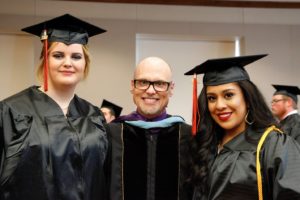
Waco ISD’s two associate degree graduates with me: Kiara Jackson, Waco High School, and Isabella Lozano, University High School. These young women have both claimed the title of first student in their high schools to graduate with an associate degree.
One Waco High School student, Kiara Jackson, achieved this feat in only three years—graduating from high school a year early and from her associate program three years ahead of schedule. The students completed these degrees at no cost to themselves, helping to meet the state’s fourth strategic goal of reducing student debt levels. These students avoided costs by participating in programs offered at their high schools that are free of charge. Rapoport Academy’s Early College High School and Waco ISD’s ACCELERATE Early Degree Program are just two innovative ways that regional educators are creating options for our students to eventually earn more as workers and contribute to their communities at higher levels as consumers.
Questions about these types of programs can easily be answered by a high school counselor or current participant; however, three main misconceptions tend to keep students from taking advantage of these types of opportunities:
How does a student have time to meet all the high school graduation requirements and complete a college degree at the same time? Do they have a longer year, go to night school, or have to attend during the summer? – “Dual credit” classes allow students to earn both high school and college credits at the same time. For example, MCC’s History 1302 can be taken to fulfill both the required credit for high school US History and to complete the U.S. History course requirement for any degree issued at a Texas public college or university. Therefore, with smart planning, students can complete classes that earn credit towards high school graduation and a college degree.
How does a student know what classes will be accepted by universities, particularly out of state? Who will help them navigate that? – McLennan Community College advisors are extremely knowledgeable about transfer credits and acceptance of classes. Advisors are required to meet each semester with students prior to enrollment, once two classes are completed. During this advising, they will ask students what schools interest them and what their anticipated majors will be. From that, advisors will determine the best classes for the students. Parents and students can always verify transfer policies for any college by calling the transfer coordinator (whose name can be found on the college’s website) to discover how transfer coursework will be accepted once the student is admitted to the university.
Does this type of program keep students from participating in other school activities? – Because students are accelerating their instruction (sometimes by up to four grade levels), they should consider limiting participation in some activities, especially those that cause them to miss school frequently or require long practice hours outside of the school day. Since grades in these courses impact the students’ high school and college GPAs, an overloaded schedule many times will avert focus from academics (or cause students to have tremendous worry about those academics) and performance suffers. This does not mean students must give up all extra-curricular activities. They can participate in activities such as band or choir, sports, and clubs; however, they should make wise choices when investing time and carefully evaluate the time commitment required of each activity before committing to it.
Perhaps if these types of opportunities had been offered when I was a senior, I would have taken advantage of them and saved myself a great deal of time, money, and stress. We have programs to help increase college access throughout our community—Communities in Schools, VOICE, Project Link, just to name a few. Parents who did not attend college should not feel embarrassed about asking for guidance on how to help their children navigate this process. We are all in this together: schools, businesses, the P20 council and the State of Texas. Together, we can meet the state’s challenge and meet its lofty goal, while simultaneously helping to make Waco a more prosperous community.
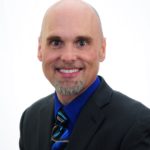 Dr. Scott McClanahan is the Executive Director of Secondary Curriculum and Instruction for the Waco Independent School District. Originally from the Chicago suburbs, Dr. McClanahan moved to Texas to earn both his Masters degree and Doctorate. He has been a middle school and high school teacher, a community college professor, and a university adjunct professor.
Dr. Scott McClanahan is the Executive Director of Secondary Curriculum and Instruction for the Waco Independent School District. Originally from the Chicago suburbs, Dr. McClanahan moved to Texas to earn both his Masters degree and Doctorate. He has been a middle school and high school teacher, a community college professor, and a university adjunct professor.
The Act Locally Waco blog publishes posts with a connection to these aspirations for Waco. If you are interested in writing for the Act Locally Waco Blog, please email [email protected] for more information.
By Christine Holecek
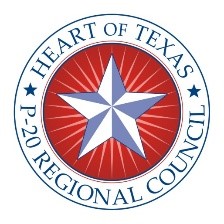 Preparing local students for a successful journey through school and college to careers is critical to the well-being and growth of our community. The Heart Of Texas P-20 works to promote streamlined, transparent degree pathways for students to move quickly and successfully through their education and onto college and/or a career. The Heart of Texas (HOT) P-20 brings together representatives from the independent school districts (ISD), institutions of higher education (IHE), Region 12 Education Service Center, industry and government across six counties: Bosque, Hill, Falls, Limestone, Freestone and McLennan to work towards this goal.
Preparing local students for a successful journey through school and college to careers is critical to the well-being and growth of our community. The Heart Of Texas P-20 works to promote streamlined, transparent degree pathways for students to move quickly and successfully through their education and onto college and/or a career. The Heart of Texas (HOT) P-20 brings together representatives from the independent school districts (ISD), institutions of higher education (IHE), Region 12 Education Service Center, industry and government across six counties: Bosque, Hill, Falls, Limestone, Freestone and McLennan to work towards this goal.
The HOT P-20 mission can best be summarized as follows:
- Collaborating by building cross-community team to address education and career possibilities for all students.
- Informing our diverse communities about ongoing initiatives, best practices and available resources.
- Advocating for educational best practices with at the state and local levels.
Upcoming Activities include
Collaborating:
Heart of Texas P-20 Forum “State of Education Conference” (Session# 146917) – April 26, 2018 – 11:00 to 2:00 – Education Service Center Region 12
Informing:
A look at SAT from a Math Perspective (Session #126532) – February 27, 2018 – 9:00 to – 4:00 – Education Service Center Region 12
21st Century New, Emerging, and Evolving Careers (Session #126482) March 1, 2018 – 9:00 to 12:00 – Education Service Center Region 12
CTE Quarterly Network Meeting (Session #126446) – April 26, 2018 – 9:00 to 11:00 – Education Service Center Region 12
Connect3 Conference – June 6-8, 2018 – ESC Region 12
Counselor Summer Fly-In – June 11-15, 2018 – MCC/TSTC
Advocating (Student Events):
Construction and Welding Expo “Build Your Future” – March 23, 2018 – 8:00 to 3:30 – Greater Waco Advanced Manufacturing Academy
YES! Expo – May 15, 2018 – 8:00 to 4:00 – Extraco Events Center
 This Act Locally Waco blog post was written by Christine Holecek. Christine is an Education Specialist at Education Service Center Region 12 in Waco. She has worked in the area of Adult Education and Career & Technical Education for the past 25 years. She earned an AAS degree from MCC, a BAAS and Master’s Degree from the University of North Texas and is currently enrolled in the Doctoral Program in Educational Leadership and Policy Studies at Tarleton State University.
This Act Locally Waco blog post was written by Christine Holecek. Christine is an Education Specialist at Education Service Center Region 12 in Waco. She has worked in the area of Adult Education and Career & Technical Education for the past 25 years. She earned an AAS degree from MCC, a BAAS and Master’s Degree from the University of North Texas and is currently enrolled in the Doctoral Program in Educational Leadership and Policy Studies at Tarleton State University.
The Act Locally Waco blog publishes posts with a connection to these aspirations for Waco. If you are interested in writing for the Act Locally Waco Blog, please email [email protected] for more information.
(The Heart of Texas P-20 Council includes representatives from K-12 education, higher education and employers. They meet regularly to help coordinate efforts to launch our young people into productive lives as workers and citizens. This post is one in a monthly series of posts intended to share information about the work of this important group in our community. For more posts in this series, click here: P-20 education. – ALW)
By Christine Holecek
All across Texas, students are finding their voices, setting goals, and taking steps towards securing their own successful futures. Through these efforts, they become an integral part of a growing movement known as Generation TX. These students are what’s next for our state. They have the power to become the most successful generation ever.
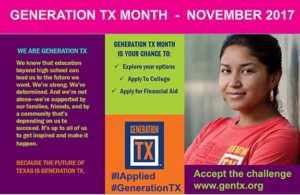 What is Generation TX Month? Generation TX Month combines college admissions and financial aid application efforts into one. Generation TX Month events are designed to take place when schools and community organizations typically host college fairs, financial aid drives, and other college and career-related events. The Generation TX Month provides the perfect opportunity to build on these initiatives around college and career readiness, pull them together to make a broader impact, and expand their reach.
What is Generation TX Month? Generation TX Month combines college admissions and financial aid application efforts into one. Generation TX Month events are designed to take place when schools and community organizations typically host college fairs, financial aid drives, and other college and career-related events. The Generation TX Month provides the perfect opportunity to build on these initiatives around college and career readiness, pull them together to make a broader impact, and expand their reach.
Generation TX Month focuses on getting students, especially those in middle school and high school, thinking about their future with a range of actions and next steps that they can take toward college and career readiness, including:
Prepare (Middle & High School Students)
- Career Exploration
- Finding a Mentor
- Creating a Brag Sheet
- College Visits
- PSAT, SAT, ACT
Apply (High School Seniors)
- College Applications
- Financial Aid Applications
- College Scholarships
Download your planning guide today
The Heart of Texas P-20 Council believes that achieving college and career readiness allows students to reach their fullest potential. By accepting the GenTX challenge the council is acknowledging the focus on the future of our workforce and encouraging them to focus on their goals for college and career. GenTX also provides a college planning and financial aid guide to help parents and students make decisions about the future.
Download College Planning & Financial Aid Guide
Student Tools
- ApplyTexas – If you are applying to a public two-year or four-year institution in Texas, you will need to complete the ApplyTexas application. This application is available at www.ApplyTexas.org. Once completed, you can use this one application to apply to many schools across Texas.
- Applying for Financial Aid – The FAFSA is the primary form you will need to apply for most financial aid
- College Major – What College Major is best for you? Find out at MyMajors After taking this assessment, you will be recommended the top majors, colleges and careers based on your academic achievements, interests and personality.
Generation Texas Month supports the regional efforts and goals of the 60x30TX Texas Challenge to Reach Higher, an initiative to increase college applications, FAFSA completions, and college readiness across Texas.
 This Act Locally Waco blog post was written by Christine Holecek. Christine is an Education Specialist at Education Service Center Region 12 in Waco. She has worked in the area of Adult Education and Career & Technical Education for the past 25 years. She earned an AAS degree from MCC, a BAAS and Master’s Degree from the University of North Texas and is currently enrolled in the Doctoral Program in Educational Leadership and Policy Studies at Tarleton State University.
This Act Locally Waco blog post was written by Christine Holecek. Christine is an Education Specialist at Education Service Center Region 12 in Waco. She has worked in the area of Adult Education and Career & Technical Education for the past 25 years. She earned an AAS degree from MCC, a BAAS and Master’s Degree from the University of North Texas and is currently enrolled in the Doctoral Program in Educational Leadership and Policy Studies at Tarleton State University.
The Act Locally Waco blog publishes posts with a connection to these aspirations for Waco. If you are interested in writing for the Act Locally Waco Blog, please email [email protected] for more information.
By Diego Loredo
Finally, after coming to University of North Texas, I am close to graduating with a degree in public relations. I first attended UNT in 2014 and now I am set to graduate next semester in May. The time has seriously flown by and here are just a few things that I have experienced and am dealing with right now.
Throughout my years at UNT, I have met many great people. I’ve met them in my dorm during my freshman year, in class, at work, or even just walking through campus or through downtown Denton. However, there’s a group of people that I especially am grateful to have met. I met these guys during my freshman year and what really got us together was soccer. We competed in outdoor and indoor soccer intramurals at UNT and have done it every semester ever since. Not only that, but we go out together a lot. Whether it’s to a party, to a restaurant, or even to go out of town, we’re usually together. These guys are more than my friends, they’re my brothers and having them by my side has made this senior year a lot less stressful.
One thing that I have realized is that time waits for no one. I’m almost at the end of my college career and I am in need of experience, work experience. I have attended a few college fairs and am also applying to several internships. This is something I wish I had done sooner because now I am kind of in a rush to get an internship for next semester. In the school I’m in we are required to intern somewhere in order to graduate. I could have done one during the summer but I was struggling financially back then so I decided to work instead. Now that I’m fine (financially) I am doing my best to find an internship that best suits my needs and what I want to do after college.
With senior year comes a lot of stress and this is something that I am currently dealing with. “Will I be able to graduate in time?” “Will I pass my classes?” “What about an internship? Is there anyone who will allow me to intern there?” These are all questions that go through my mind every day, along with many others.
Senior year can be scary. In less than a year, I’ll be out there on my own starting my own career. I get anxious whenever I think about it but I also get excited at the many opportunities that are available. Whenever I get stressed out, I talk to my roommates about it or I talk to my closest friends. It’s crucial to have that group of friends that you can always count on to help you when you’re feeling stressed out. Another way that I have dealt with it is going out, either to eat or to just get out of the house. This helps get my mind off of what is bothering me and has worked a lot this year and previous years as well.
Not everything is going to go your way in college. I’ve failed classes, embarrassed myself many times, struggled both academically and financially, and I’ve been discouraged whenever I see other people doing things better than me. But I’ve never let it keep me down. I’ve retaken those classes with the help of other friends, I’ve come to accept the times I’ve embarrassed myself and even joked about it a few times, I got over my financial struggle and am working to get over my academic struggle, and I now get motivated whenever I see someone in a better situation than me. You learn a lot about yourself during college. My goal now is to finish this semester strong and go home to enjoy the holidays with my family before I take my final semester at UNT. I plan on taking it day-by-day and make sure I take in every bit of “the college life” before I move on to the next step in my career.
 Diego Loredo is a senior at the University of North Texas and is majoring in public relations. He is a scholarship recipient of the Brazos Education Foundation, otherwise known as “Brazos Scholars.” He graduated from University High School in 2014. He plans on working in sports PR or for a nonprofit. He loves to play soccer and is a huge FC Dallas fan.
Diego Loredo is a senior at the University of North Texas and is majoring in public relations. He is a scholarship recipient of the Brazos Education Foundation, otherwise known as “Brazos Scholars.” He graduated from University High School in 2014. He plans on working in sports PR or for a nonprofit. He loves to play soccer and is a huge FC Dallas fan.
By Christine Holecek
The mission of the Heart of Texas P-20 Council is to assist with the collaboration of education, business, and community to maximize the utilization of resources, programs and services for all students while encouraging a culture of life-long learning. We envision that all students can reach their true potential as happy, healthy, productive and self-sufficient citizens. One local event that helps with this mission is S.T.E.A.M. Day.
The City of Waco, along with ESC Region 12, is hosting its annual S.T.E.A.M. Day on October 11. Geared towards middle and high school students in the Central Texas area, this event helps students explore the fields of science, technology, engineering, architecture, arts and mathematics (S.T.E.A.M.). Participating students will be able to speak directly with professionals about career choices in various fields. S.T.E.A.M. Day is a free, come-and-go exhibition for schools and at the Waco Convention Center. The attendance has continued to grow over the past several years. Last year over 2,200 students from 40 schools registered for the event, along with 86 exhibitors from various career fields. Our exhibitor roster included local manufacturing companies, higher education establishments, engineering and architecture firms, and also high school robotics teams. This event is free to exhibitors as well.
This is an awesome event for students to get a hands-on opportunity to see future careers in action. This event has morphed over the years from “Engineering Day” to “STEM Day” and now “STEAM” Day. This event is held annually in October to inspire students to pursue careers in the community in science, technology, engineering, architecture, art and mathematics. This event is hosted by the City of Waco Public Works Department. This year’s event will be held on Tuesday, October 11, 2017 at the Waco Convention Center from 8 a.m. to 2 p.m.
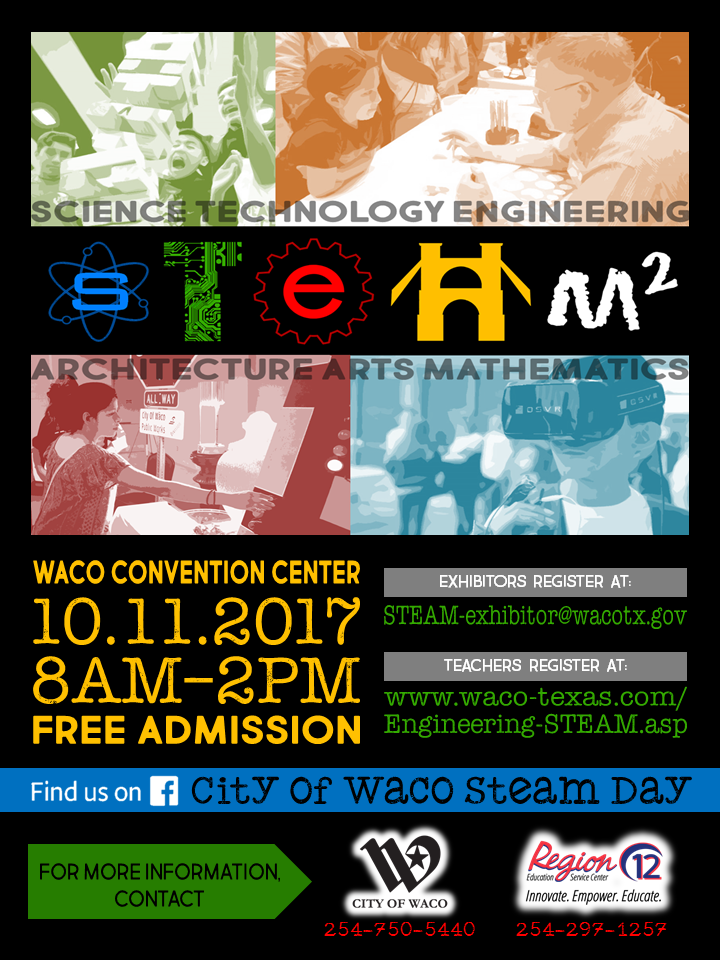
 This Act Locally Waco blog post was written by Christine Holecek. Christine is an Education Specialist at Education Service Center Region 12 in Waco. She has worked in the area of Adult Education and Career & Technical Education for the past 25 years. She earned an AAS degree from MCC, a BAAS and Master’s Degree from the University of North Texas and is currently enrolled in the Doctoral Program in Educational Leadership and Policy Studies at Tarleton State University.
This Act Locally Waco blog post was written by Christine Holecek. Christine is an Education Specialist at Education Service Center Region 12 in Waco. She has worked in the area of Adult Education and Career & Technical Education for the past 25 years. She earned an AAS degree from MCC, a BAAS and Master’s Degree from the University of North Texas and is currently enrolled in the Doctoral Program in Educational Leadership and Policy Studies at Tarleton State University.
By Dasjaevian Dixon
We all face certain challenges in college. I struggled consistently with time management and finding study strategies that worked for me. But, I am now more strategic and resourceful in overcoming those struggles.
I was not working during my first year of school at the University of North Texas. That allowed me to have extra downtime to enjoy my experience as an incoming freshman. As a freshman, I had plenty of time to take care of my academic studies, socialize, and participate in extracurricular activities. However, that time swiftly diminished the following year.
I started my first year-round job as a college student the fall of my sophomore year. I was enrolled in 15 credit hours, working 25 hours a week, and involved in 3 organizations. This is when time management started to become vital to my success in the classroom as well as my physical health. I was moving around during the week so much that I forgot to stop and eat sometimes. I was worried about accomplishing everything that I committed to do.
Balancing my priorities and allocating an appropriate amount of time to each responsibility was a huge challenge. I started using my planner more often than I did the previous year. That helped me keep up with work and due dates. It also helped me organize priorities. That, along with the help of my mentors, allowed me to get through the semester without being overly stressed. My mentors assisted in keeping me level headed by providing positive feedback. I am very appreciative of what they have done for me thus far.
When I have felt discouraged, my family and mentors have been there to encourage me. Having a strong support system has been a valuable way for me to overcome challenges dealing with time management. Transitioning from one semester to another is easier now. However, there is always room for improvement.
Studying and taking exams sometimes bring anxiety. I have not always been the best test taker. First exams are usually more difficult for me due to not knowing what to expect, the format, etc. The lower level courses generally didn’t require me to study as much as I have to for higher level courses now. It has been difficult for me to adopt a specific study routine, because all of my courses vary in regard to concepts and material that we are tested over.
Some classes require more focus than others. As I start my last year as an undergraduate, I have learned that studying for at least 30 minutes to an hour after class can help me retain information more thoroughly. Unfortunately, most days require me to put a lot of focus on my job and organization activities. Remember that balance?
Now, studying is more efficient when I plan a week in advance before an exam instead of waiting until a few days before. The challenge of finding an effective study method has made me embrace planning. When I study efficiently for a short amount of time, I do better than when I study for an extended amount of time during a two or three-day span. This has allowed me to pace myself and figure out what I need to change to see better exam results.
Challenges allow us to learn and grow. They are inevitable. You can either look at it from a positive or negative perspective. I have chosen to use them as learning tools to become a better student and person. I have shared my insight in an effort to motivate other students to embrace and overcome the challenges they are faced with throughout college. Learning is everlasting.
 Dasjaevian Dixon is an undergraduate student at the University of North Texas studying Marketing with a double minor in Decision Sciences and Psychology. He is currently interning at Walt Disney World in Orlando, Florida. Dasjaevian is a Brazos Education Foundation scholar. He currently serves as the Vice President for The Presidential Men, an organization he helped implement at UNT. He also assists with helping grant the wishes of children with life-threatening medical conditions for the Make-A-Wish Foundation. Owning his own business in the future is one of his top goals. As a millennial, he is building on his personal and professional skills to become a valuable asset in the business field.
Dasjaevian Dixon is an undergraduate student at the University of North Texas studying Marketing with a double minor in Decision Sciences and Psychology. He is currently interning at Walt Disney World in Orlando, Florida. Dasjaevian is a Brazos Education Foundation scholar. He currently serves as the Vice President for The Presidential Men, an organization he helped implement at UNT. He also assists with helping grant the wishes of children with life-threatening medical conditions for the Make-A-Wish Foundation. Owning his own business in the future is one of his top goals. As a millennial, he is building on his personal and professional skills to become a valuable asset in the business field.
The Act Locally Waco blog publishes posts with a connection to these aspirations for Waco. If you are interested in writing for the Act Locally Waco Blog, please email [email protected] for more information.
